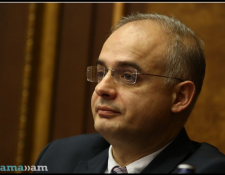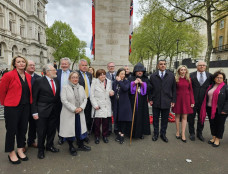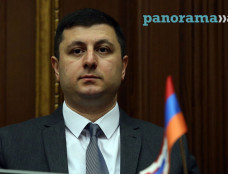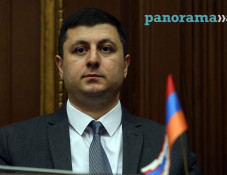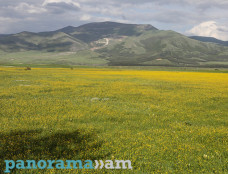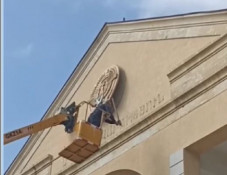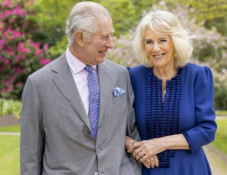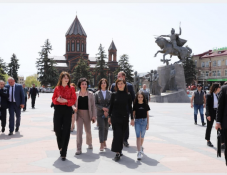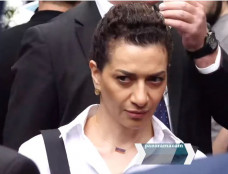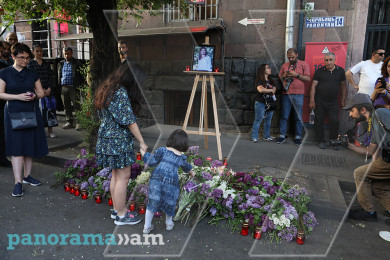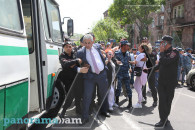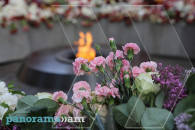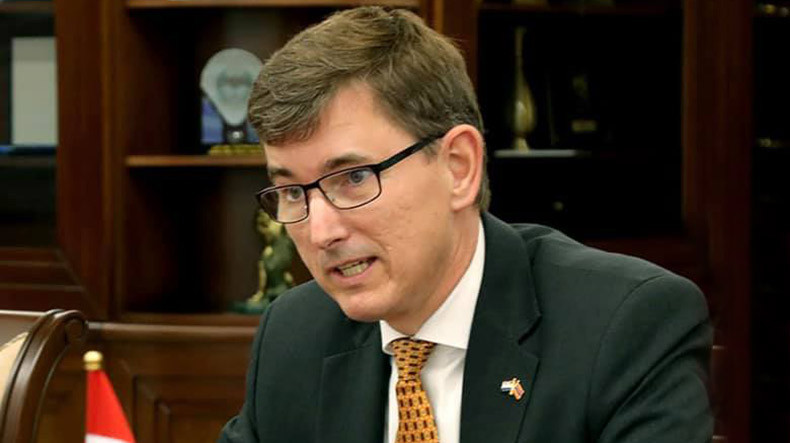
Dutch ambassador: Minsk Group co-chairs are the ones to take the lead in finding more permanent solution to Karabakh conflict
Panorama.am’s interview with Ambassador of the Kingdom of the Netherlands to Armenia Nico Schermers.
Question: Mr. Ambassador, first of all I would like to congratulate you on receiving an Armenian PR award in the special Friend of Armenia category. Does it stimulate you to push ahead with the intensive activity that you have started since coming here?
Answer: For me it’s an honor to receive an award like this, because it’s a sign that not only myself, but we, as an embassy team, are doing things right. I see it really as an award for the embassy team, because the staff are also preparing all these meetings and helping me with my tweets, my Armenian teacher played an important role.
Question: Have you started learning Armenian?
Answer: Yes, I am learning Armenian [replies in Armenian]. I can read and write, I can say a couple of sentences and I am trying to improve that.
.jpg)
Question: You are the first Ambassador of the Netherlands to Armenia. You came to a country where the Netherlands did not have a so-called diplomatic "institutional memory". Taking into account your previous rich work experience in Indonesia, Australia, Egypt, what challenges did you face in Armenia, how did you adapt to the change?
Answer: I think maybe it’s nice to describe how I arrived here. That was at the end of August, I arrived by a Belavia flight on Saturday morning. The Ministry of Foreign Affairs, the Protocol Department, picked me up from the airport, brought me to my apartment. I had to go into quarantine for a day. The apartment was rented by my colleagues in Tbilisi, we just did that with some pictures from the internet and did not know where it was.
Basically I didn’t know anyone in the city. I arrived here with my 3 suitcases, I didn’t have an office, I didn’t have a proper house, I didn’t have friends, a car. So, that was all quite interesting to start with. Days after, of course I started to meet people, I had, of course, met a number of people electronically, that’s I started to ‘build a skeleton’. After a week I was able to present my copy of credentials to the former minister of foreign affairs and then, two weeks later, my credentials to the president. In the meantime, also a colleague had arrived from the Netherlands, so there were two of us and we had settled down here in Marriott [hotel] in two rooms.
And from then first we got the war, so our plans to start building an embassy were basically hampered. We were to report on the situation here, and in that regard I was glad that I had landed before the war started, because that enabled me to inform my government about developments from this side, realizing that in many EU countries information was difficult because many European countries are not represented in Armenia.
The challenges were basically the fact that I had to really start from scratch, but I knew from the start the situation I was going to get in. What was nice in that respect is Armenia is a very warm country, very hospitable people, it’s a very safe city and country to live in. So, in that regard it was really a pleasure to be here.
(5)(1).jpg)
Question: Mr. Ambassador, as you said, you came to Armenia during the most difficult period for us, when Azerbaijan unleashed a war against Artsakh. During all this time, the Dutch government and parliament have expressed support for Armenia through numerous resolutions and appeals. The ceasefire was established by the November 9 trilateral agreement, but the Nagorno-Karabakh conflict remains unresolved. What is your perspective on the settlement of the issue?
Answer: Well, first of all maybe a couple of clarifications: the Dutch government has always regarded the conflict as a longer conflict than 44 days. It started 32 years ago, maybe even before that, that makes the whole conflict very complex. That’s where the Dutch government tries to seek some sort of balance in our position. Our parliament has adopted a number of motions in support of Armenia, but that is not the same as the government.
At the same time, we also acknowledge that a couple of issues are at the moment very important. Basically, I would mention the prisoners of war (POWs). That’s where the Netherlands are demanding from Azerbaijan to fulfil its commitments of the international law. We regard these prisoners as prisoners of war and they should be released according to international law.
But there are many other issues which are beyond me to speculate on how they can be solved. The Dutch position is that, well it has always been and still is that the Minsk Group co-chairs are the ones to take the lead in finding a more permanent solution. That’s what we support, all our work is done to support these Minsk Group co-chairs. And also the Netherlands is a very small country, with regard to this part of the world our interests are limited, therefore we look very much to the EU and beyond that the OSCE Minsk Group co-chairs.
Question: Coming to the POWs, seven months after the war Azerbaijan refuses to release Armenian prisoners of war, violating international and humanitarian law, despite numerous calls, resolutions, and ECHR rulings. Shouldn't Azerbaijan's non-fulfillment of its international obligations, human rights violations, invasion of the neighboring country's sovereign territory lead to clear and targeted sanctions?
Answer: Well, that’s a question not to me to answer, because as an ambassador in Armenia, I report the situation here, what I see I give my views to my government, I give advices on certain topics, but then it’s my government in The Hague to decide on policies towards what to do with that kind of information. That is also discussed in Brussels, between the EU member states, in Vienna, between the OSCE members, etc. So, I am only in that regard giving input to my government for these kind of discussions, and then in the international multilateral fora something will be decided or not.
Question: On May 12, Azerbaijani forces invaded the sovereign territory of Armenia and captured six Armenian soldiers from the country’s territory on May 27. As far as I know, you were among the EU ambassadors, who visited the territory of the Black Lake. What can you say about your trip to the region and the consequences we are facing now?
Answer: It’s a very difficult and complex situation because we are working on the basis of non-delimitated borders. The border between Armenia and Azerbaijan has never been delimitated.
Basically, it was great that the Foreign Ministry was able to facilitate for us this trip, as it was a request form the EU to go there with the EU ambassadors to see for ourselves what the situation was. We went into the mountains and saw an area where there were a couple of hilltops where Azerbaijani flags were put on, there were Azerbaijani troops on those hilltops. And if you look at international maps, like Google Maps, you see that those hilltops are on the Armenian side of the border. So, that’s what I reported back to my capital.
We were shown some Soviet maps signed by both Azerbaijan, Armenia and the Supreme Soviet, indicating that these hilltops were on the Armenian side of the border. I cannot yet draw the conclusion that the legal border, as it’s now indicated on the international maps, is indeed the rightful border between Armenia and Azerbaijan. That’s the only question I still have. That question is basically to be answered between Armenia and Azerbaijan, and perhaps also Russia as part of the former Soviet Union to establish where exactly the border should be. And if it’s indeed on that place, then it’s clear that the troops are on the Armenian side. If for some reason the negotiations would lead to a different conclusion, that would be a different situation.
What I have seen is Azerbaijani flags on areas which are currently indicated as Armenian territory.
Question: The support of the Netherlands in mitigating the post-war effects was significant. As we saw, Dutch specialists came to Armenia to treat our wounded soldiers, a prosthetics department opened at the Homeland Defender’s Rehabilitation Center․ What other measures are being taken with the support of the Netherlands to overcome the consequences of the war?
Answer: I also want to mention that you have a very active diaspora of Armenians in the Netherlands. They are partly Dutch and partly Armenian. They feel often connected to both countries. They are Dutch citizens, they are Armenian citizens, they live in both worlds and make good connection between our two countries. Especially the project you mentioned was an initiative of that group, it was not a government-funded project.
Basically, when I arrived here I inherited a number of programs from my colleagues in Tbilisi covering Armenia before. And we are not active in the health sector as such, because we have a limited program, so we have to make choices. However, as they are Dutch Armenians or Armenian Dutchmen or whatever you want to call them, I very much support that kind of initiatives whenever I can.
At the same time, we are currently looking into possibilities to support Armenia in different ways. We have a couple of priorities also inherited from the past and that’s what we are now trying to revalue, is this still the right priority or not. Basically, that is in the rule of law, democracy issues, human rights in a wider sense, economic topics like agriculture and IT sector, maybe a little bit of tourism, if Covid allows again.
Question: You spoke about democracy, is Armenia democracy from your point of view? It is sometimes said that democracy does not work in all countries. This question comes to mind especially after the war. Being a democratic country, unlike dictatorial Azerbaijan, it did not help us to have the international community’s support during the war. Is it the best for all countries in our region?
Answer: I cannot speak for other countries. I can just say that from perspective of human rights and from the perspective of the development of a country truly developed democracy where freedom of religion, freedom of anything is possible will in the end lead to better societies. Why, because it allows all the people of your country to participate in the economy, in the social affairs, in the political arena and therefore will bring forth the best in everyone and therefore some of that will result the best situation for your country.
Is Armenia democracy? I think so.
In the past couple of months, we have seen quite some political turmoil and at some stage the issue of a coup d'etat was even mentioned. My colleagues in The Hague were asking me what is going on, they were very concerned and I told them, listen, I still see democracy at work. People are talking here, I don’t see tanks in the streets, I see discussions, demonstrations. That is part of democracy. Democracy is bringing together the voices of everyone, the opinions of everyone and that should result at some point in vision of the country to go in a certain direction.
You are now going to enter elections. I think it’s very important that everyone goes to the ballots and puts their vote somewhere because that will help Armenia in its further development whatever the outcome may be.
Interview by Anna Mkrtchyan
Newsfeed
Videos





